Politics in North Macedonia occur within the framework of a parliamentary representative democratic republic, whereby the Prime Minister is the head of government, and of a multi-party system. Executive power is exercised by the government. Legislative power is vested in both the government and parliament. The Judiciary is independent of the executive and the legislature. The Economist Intelligence Unit rated North Macedonia a "flawed democracy" in 2022.

The Internal Macedonian Revolutionary Organization – Democratic Party for Macedonian National Unity, often simplified as VMRO-DPMNE, is a conservative political party in North Macedonia and is the main centre-right to right-wing party in the country.

The Social Democratic Union of Macedonia is a social-democratic political party, and the main centre-left party in North Macedonia. The party is considered pro-European.

The Democratic Union for Integration is the largest ethnic Albanian political party in North Macedonia and the third largest political party in the country. It was formed immediately after the country's 2001 armed conflict between the National Liberation Army and Macedonian security forces. NLA founder Ali Ahmeti has been the party's president ever since.
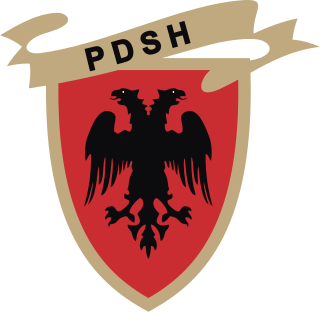
The Democratic Party of Albanians or DPA is a political party of ethnic Albanians in North Macedonia. The DPA is a merger of the Party for Democratic Prosperity of Albanians (PDPA) and the People's Democratic Party (NDP) which took place in June 1997. The former party was established in 1994 after some radical members of the Party for Democratic Prosperity, led by Menduh Thaçi and Arbën Xhaferi, left the PDP and the latter party was founded in August 1990 as a more radical opponent of the PDP.

The Socialist Party of Macedonia is a political party in North Macedonia founded on 22 September 1990 as a successor to the Socialist Alliance of Working People of Yugoslavia. The SPM proclaims itself to be a left-wing democratic socialist party. The SPM was part of the coalition governments from 1992 to 1998, led by the SDSM. The party's first leader was Kiro Popovski and was led by Ljubisav Ivanov-Dzingo after until his death in 2020. The party's current leader is Ljupco Dimovski.
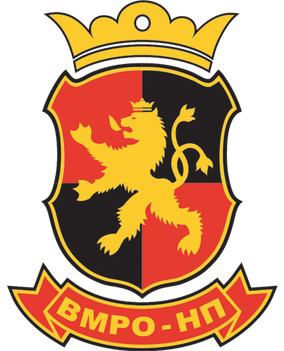
VMRO – People's Party, fully the Internal Macedonian Revolutionary Organization – People's Party, is a national-conservative political party in North Macedonia, formed by the followers of the former Prime Minister Ljubčo Georgievski who split from the VMRO–DPMNE. The VMRO–NP was founded in Skopje on 4 July 2004. Vesna Janevska was elected as the party's first chairwoman.
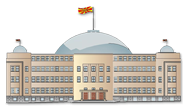
The Assembly of the Republic of North Macedonia, or the Sobranie, is the unicameral legislature of North Macedonia. According to the Constitution, the Sobranie represents the people and is vested with legislative power. It can have between 120 and 140 MPs, elected by proportional representation from 6 electoral districts, each contributing 20 MPs, and there are also 3 reserved seats elected from the Macedonian diaspora which are awarded only if the voter turnout was sufficient. MPs are elected for a term of four years and cannot be recalled during their term. The Sobranie is presided over by a President. Its organization and functioning are regulated by the Constitution and Rules of Procedure. The Assembly's seat is in the Sobranie Palace in country's capital Skopje.

Early parliamentary elections were held in Macedonia on 1 June 2008, after the Assembly voted to dissolve itself on 12 April 2008. The result was a victory for the VMRO-DPMNE-led alliance, which won 63 of the 120 seats in the Assembly.

The Liberal Democratic Party is a social-liberal political party in North Macedonia. The Liberal Democratic Party was launched in April 1997 as a merger between the Liberal Party and the Democratic Party. The first leader of the party was Petar Goshev from the Democrats, who was also the last president of the League of Communists of Macedonia. When the Liberal Party was re-established in 1999, a significant portion of the former Liberal Party remained in LDP.
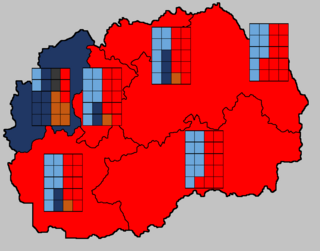
Early parliamentary elections were held in the Republic of Macedonia on 5 June 2011, a year earlier than necessary. All 123 parliamentary seats of the Sobranie were due for election, including the 3 seats provided for the first time for representatives of the Macedonian citizens living abroad: 1 from Europe, 1 from North America, and 1 from Asia and Australia. The decision of the ruling parties, the Christian Democratic VMRO-DPMNE and the ethnic Albanian Democratic Union for Integration (DUI), to dissolve the Parliament and call for an early election was preceded by protests of the Social Democratic Union (SDSM), the major opposition party, and subsequent boycott of the Parliament by them, and by other smaller opposition parties.

Skanderbeg Square is a square in Skopje, North Macedonia.

The sixth local elections for the election of local mayors of the municipalities of the Republic of Macedonia and members of municipality councils were held on schedule in 2013. There were two large coalitions on the elections: the Coalition for a Better Macedonia led by VMRO-DPMNE and the Union for the Future led by SDSM. Also present on the elections was the Democratic Union for Integration (DUI), Democratic Party of Albanians (DPA) and the Union of Roma Forces. There was also coalition made between the two major rival parties VMRO-DPMNE and SDSM in Kičevo and Struga municipalities against the ethnic Albanian candidates Fatmir Dehari and Ramiz Merko of DUI. There were two rounds in the elections on March 24, 2013 and April 7, 2013. The first round of elections were declared the most peaceful elections in the history of independent Macedonia without any serious incidents. The elections were however not untainted, as the situation in the Centar Municipality was labeled as undemocratic by the Macedonian opposition with several voters being labeled as questionable for having only recently received their national ID cards and not being actual inhabitants of this respective municipality. The elections in this municipality lasted for three turns and were monitored by the foreign embassies.
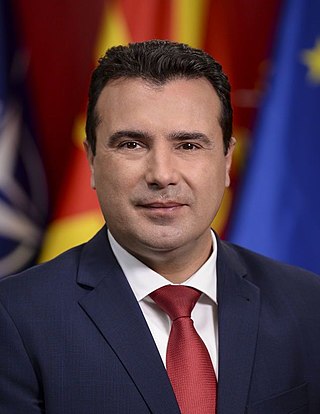
Zoran Zaev is a Macedonian economist and politician who served as prime minister of North Macedonia from May 2017 to January 2020, and again from August 2020 to January 2022.

General elections[a] were held in the Republic of Macedonia in April 2014 to elect the President and members of parliament. The first round of the presidential elections were held on 13 April, with incumbent president Gjorge Ivanov finishing first with 53% of the vote. However, as he did not receive the support of 50% of all registered voters, a second round was held on 27 April, alongside parliamentary elections, with Ivanov and the ruling coalition led by VMRO-DPMNE claiming victory as Ivanov was elected president and the VMRO-DPMNE won 61 of the 123 seats in the Assembly.

The fourth Cabinet of Prime Minister Nikola Gruevski is the Republic of Macedonia Government cabinet announced on 19 June 2014. It is the 11th cabinet of the Republic of Macedonia. Gruevski's second cabinet was formed following the April 2014 election won by the right-wing VMRO-DPMNE.

Early parliamentary elections were held in Macedonia on 11 December 2016, having originally been planned for 24 April and later 5 June.
Storming of the Macedonian Parliament, also known as Bloody Thursday occurred on 27 April 2017, when about 200 Macedonian nationalists stormed the Macedonian Parliament in reaction to the election of Talat Xhaferi, an ethnic Albanian, as Speaker of the Assembly of the Republic of Macedonia. It was the biggest attack in history on a Macedonian institution.

Early parliamentary elections were held in North Macedonia on 15 July 2020. It was originally scheduled for November 2020, but Prime Minister Zoran Zaev called early elections after the European Council failed to come to an agreement on starting talks with North Macedonia on joining the European Union in October 2019. The election date was set for 12 April, but was postponed until July due to the COVID-19 pandemic in North Macedonia.

Parliamentary elections were held in North Macedonia on 8 May 2024. The slow pace of EU integration and corruption were the main issues during the campaign.
















